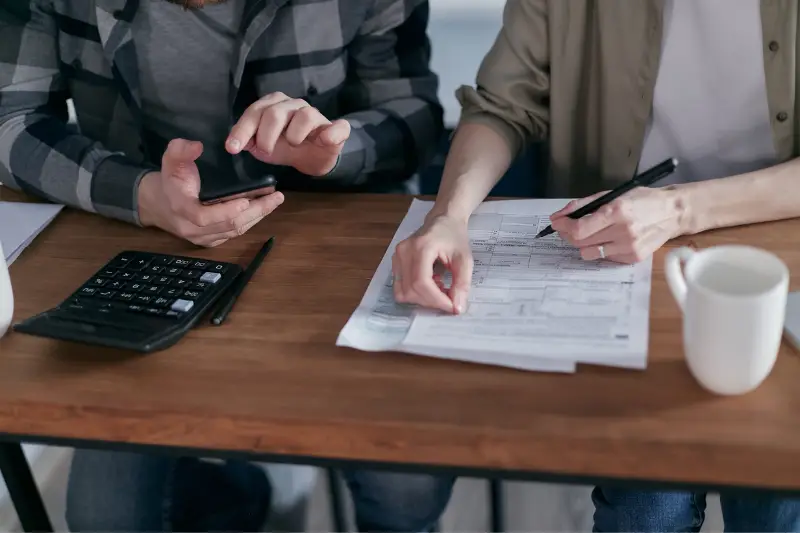Click here to get this post in PDF

When you’re running your own freelance business, it’s almost a certainty that you’ll have to pay some kind of tax at some point. But with so many complicated tax rules currently in place in the UK, it can be difficult to know exactly what your tax liabilities are – and which common errors to avoid.
So how can you stay on top of your small business tax and make sure you keep on the right side of the taxman? Here are my five tips:
1. Claiming too much for food and drink
It’s tempting to claim in your accounts the cost of any food and drink you buy when you’re working, but HMRC take a much sterner line than that. They say that, because everyone must eat in order to live, food and drink by its nature is partly a personal cost, and so they will only allow you to claim the cost of food and drink in certain circumstances.
If your business is a limited company, you can claim the cost of food and drink when you’re out and about on business. For sole traders, the rules are stricter. As a sole trader, you can only claim the cost of food and drink when you’re out and about if either:
- you’re away overnight, or
- the journey is outside your normal pattern of business, or
- your business is itinerant by nature so that you spend short periods of time at lots of different client sites (as a jobbing gardener or builder would do).
2. Thinking you have to register for VAT when you might not need to
Not all businesses – not even all limited companies – have to register for VAT. You only have to register your business for VAT once its VATable sales go over the limit set by HMRC, which changes every year and is £83,000 as of 1st April 2016.
You can register early if you wish, for example if you’ve had to pay a lot of costs and want to reclaim the VAT on those sooner rather than later, but remember that being registered for VAT will mean you have extra admin to do in the form of issuing VAT invoices and filing quarterly returns.
3. Claiming too much for business use of home
The rules for limited company directors (and other employees) for what part of your home-running costs you can claim back from your employer (the company) without paying extra tax, are quite tight.
You can’t claim any part of fixed costs that you’d pay anyway whether or not you worked at home, such as rent or council tax. You can’t claim any costs if the work you carry out at home isn’t work that earns money for your employer – so you wouldn’t be able to claim costs if you’re completing administrative tasks at home, unless you are an administrator. And you can’t claim any costs if your employer provides workplace facilities elsewhere but you choose not to use them and work at home instead.
Here is what you can claim: http://www.freeagent.com/l/working-from-home-expenses-limited-companies
The rules are less stringent for sole traders, as you’ll see here:http://www.freeagent.com/l/working-from-home-expenses-sole-traders
4. Counting income at the wrong time
It’s important to include your income in your accounts at the right time, so that you don’t risk penalties for paying tax late on that income.
If you’re using the cash basis of accounting, you’d include your income when your customer paid you for it. Otherwise, you count income when you do the work for it – regardless of when you invoice for it or are paid for it.
As an example: if you prepare accounts to 31st March each year, finish some work on 20th March 2015, invoice for it on 10th April 2015 and receive payment on 30th April 2015 – you would count that income in the year ended 31st March 2015, because that’s the year in which you did the work.
5. Claiming tax relief on personal journeys
HMRC says that you’re only allowed to claim the costs of travel, such as a train fare or an allowance for travel in your own car, for business journeys. What counts as a business journey varies – for example, if you are a company director or other employee, your journey must be “necessary for the proper performance of your duties”. Your employer asking you to make the journey doesn’t always mean it’s needful for you to do your job, so be careful!
Tax can be an incredibly challenging issue to deal with, so it’s important to do your research and get a full understanding of your tax liabilities before you tackle it. And remember – if there’s anything you’re unsure about, it’s a good idea to seek the help of a professional accountant who can help you and your business avoid falling into the quagmire!
Also read: 6 Important Tax Planning Tips Ideal for Small Businesses
About the Author
Emily Coltman FCA is Chief Accountant to FreeAgent – who provide multi-award winning cloud accounting software for freelancers and micro-businesses.


[…] You may also like: 5 common tax traps to avoid when running your freelance business […]